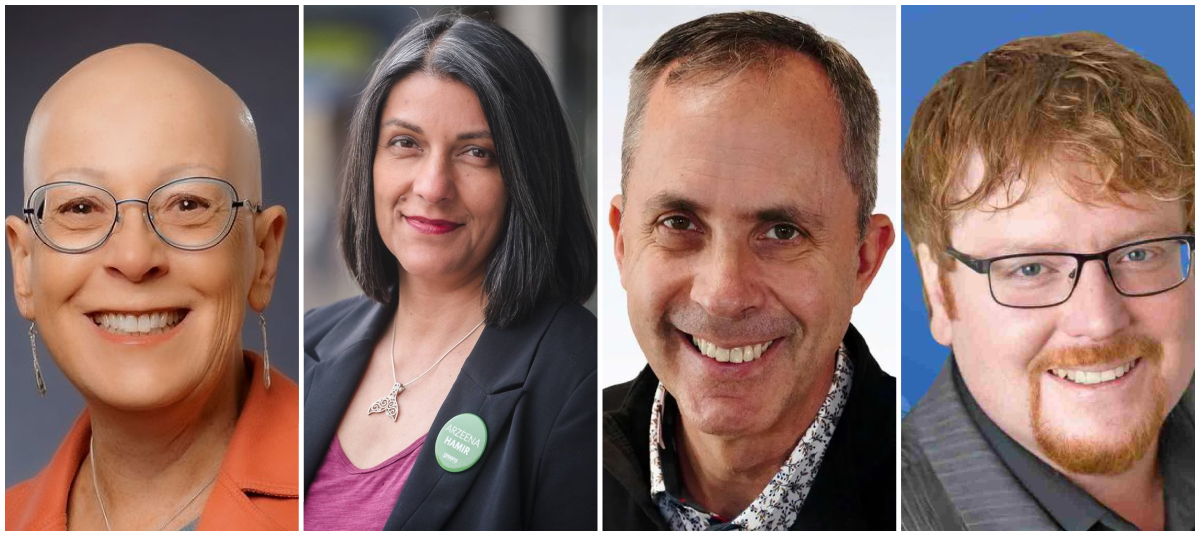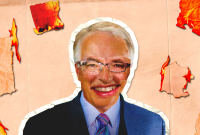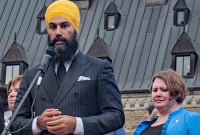Support strong Canadian climate journalism for 2025
This is the first story in a series by Canada's National Observer that will take a look at Vancouver Island's "ridings to watch" in the upcoming election.
Vancouver Island ridings are emerging as political wildcards in the upcoming British Columbia election after former BC United Party Leader Kevin Falcon unexpectedly blew up his party last week.
The sudden dismantling of BC United closed the gap between the NDP and BC Conservatives, leaving the two parties in a dead heat with decided voters in much of the province.
However, no clear frontrunners have emerged from the current political maelstrom on Vancouver Island, where the BC Green Party wields influence and the political fate of a number of BC Conservative and former opposition candidates is still undecided.
The Courtenay-Comox riding is one Island hotspot where all four major parties had backed candidates. Independent candidate John Hedican is also running in the Oct. 19 election.
In 2020, the NDP handily won the riding with 51 per cent of the vote, while the BC Liberals secured 30 per cent followed by the Green Party with 20 per cent. No BC Conservative candidate ran in the riding that year.
BC NDP incumbent Ronna-Rae Leonard and Green Party candidate Arzeena Hamir, who continue to campaign, say the collapse of BC United has caused chaos close to the election, leaving many moderate conservative voters uncertain about how they’ll vote.
“What I’m hearing at the door from people who are in the right-of-center camp is their preferred choice has been taken away from them, and that puts them in a difficult position,” said Leonard.
Constituents are voicing concerns around BC Conservatives’ “extreme views,” particularly John Rustad’s denial of the climate crisis and his opposition to sexual orientation and gender identity (or SOGI) in schools, Leonard added.
Critics allege SOGI “sexualizes” children, and Rustad states he supports “parental rights” and would eliminate SOGI. However, SOGI is being misrepresented and was developed and supported by the NDP and BC United to create a safe and inclusive space for young people, particularly those questioning their gender identity and who are vulnerable to discrimination and the risks of suicide, Leonard said.
The former BC United candidate for the coming election, Bill Coltart, told Canada’s National Observer he is still weighing whether he’ll proceed with his campaign after his party’s demise.
Some BC United colleagues have dropped out of the race and a number of the party’s respected incumbent MLAs joined the conservatives.
While at least five other former BC United candidates have announced they’ll run as independents, following the lead of incumbent MLAs Mike Bernier and Tom Shypitka, who suggest those elected can operate as a loose coalition of conservatives that can influence the balance of power in the legislature.
Coltart says “nothing is off the table” at the moment, but he intends to discuss options with his campaign team and take feedback from riding constituents before deciding.
“Our party left us, not the other way around,” he said.
“We’re not even a week away from this. It’s a seismic change in British Columbia politics.”
Coltart hasn’t been contacted by the Conservatives but noted he ran with BC United because he believed the party best fit with his “centrist” values which remain unchanged.
“I have not been offered the opportunity to run with the Conservatives, nor do I know whether I would accept it if I was offered,” he said.
He said it’s possible the influx of BC United candidates joining the Conservatives might “temper some of the extremes”.
Brennan Day, who ran in the last election for the BC Liberals (the now renamed BC United Party), was recently declared the BC Conservative candidate. He replaced Damon Scrace, who was removed from the party’s campaign after his extensive catalog of explosive and discriminatory social media posts made the news.
It’s not clear if Day will remain in the race given the horse trading of candidates is still taking place between his party and the BC United.
Day refused Canada’s National Observer’s interview requests.
The uncertainty and loss of potential candidates with the shut down of BC United is problematic for democracy, Hamir said.
“I think it doesn't help with the mistrust that most people have of the political process,” she said.
However, there’s a potential window to increase support for the Green Party as a result, Hamir added.
“Those who were leaning towards BC United … who honestly don't know where to park their vote,” she said, “it’s an opportunity for me to talk to them about the Greens and what we stand for.”
Constituents' top election concerns revolve around housing, affordability and healthcare, Leonard and Hamir agreed, while each championed their party as the best option to tackle the issues.
Leonard cited NDP policies that have increased the recruitment of doctors in the riding while the party estimates more than 15,000 people in the Comox Valley have secured a family doctor since 2021.
The NDP has maintained a “laser focus” on housing since being elected in 2017, she added. Nearly 80,000 affordable homes are built or in process across the province with 800 located in the Comox Valley, according to the NDP.
What’s more, the NDP have implemented numerous affordability measures, like eliminating MSP fees, freezing ICBC rates and boosting the Family Benefit Bonus for households with children, Leonard added.
Progress on the top issues are at risk if the Conservatives are elected and enact sweeping cuts, she said.
“We’re tackling these challenges and we're ready to keep moving forward on them, not just making life better for the people at the top, but for everybody,” said Leonard.
Hamir said as a Green Party MLA she would be free to push for grassroots solutions that meet the riding’s needs and wishes, because although the party has shared values and policies, MLAs aren’t bound to the party line.
As one example, Hamir noted that apartment construction has certainly increased in the riding in the past couple of years but it hasn’t translated into affordability — so she would push for novel affordable housing situations like tiny home villages successfully implemented in other small communities like Duncan.
“The current government’s idea is that density, by itself, will magically bring down rents, but that’s not been shown to be the truth here in the Valley.”
The core concern of the Green Party remains the climate crisis, Hamir said. Concerns such as homelessness, healthcare, or the cost of living are always viewed through a climate lens.
“I think people understand the Greens don't just have climate sitting by itself as a separate platform,” she said.
Her fight for the protection of old growth, elimination of tax subsidies for the elimination of tax subsidies for the oil and gas sector, and moving fish farms out of the ocean onto land will continue, she said.
By contrast, Hamir said what the emerging BC Conservatives will stand for following the mash-up with former BC United candidates remains a mystery.“I have no idea what this new party now stands for, and I don’t know if voters know,” she said.
“I don't think this party even knows itself.”
Rochelle Baker / Local Journalism Initiative / Canada’s National Observer
This article was updated to correct the name of the riding, which is Courtenay-Comox, not Comox-Courtenay.





Comments